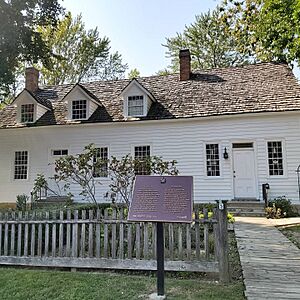Park House Museum facts for kids
| Established | 1972 |
|---|---|
| Location | Amherstburg, Ontario, Canada, |
| Type | historic house museum |
Park House is a special old house in Amherstburg, Ontario, Canada, that is now a museum. It was first built way back in 1796 in a city called Detroit. But then, in 1799, it was carefully moved across the river to Amherstburg! Many different people owned the house over the years. The most famous owners were the Park family, who lived there for a very long time – 102 years! In 1972, the Rotary Club of Amherstburg bought the house. They turned it into a museum about local history and fixed it up to look like it did in the 1850s.
Contents
The Story of Park House Museum
How the House Moved to Amherstburg
Park House was built in 1796 near the Rouge River in Detroit. Its first owner was a British loyalist, someone who supported Britain during the American Revolution. After the war, this owner moved to Fort Malden, a new British fort across the river.
In 1798, the house was taken apart piece by piece. Imagine that! Then, it was moved by canoes across the water. It was put back together in Amherstburg in 1799. The house stood in the same spot for 173 years. One of the first pictures of Park House is in a painting from 1813 by Margaret Reynolds, called A View of Amherstburg.
Early Owners and the Park Family
The land where Park House was rebuilt was given out by a special draw. The lot where the house stands was first given to a business. But then, the leader of Fort Malden, Captain Hector McLean, decided to give it to the owners of a ship called the Nancy.
In 1817, a man named Alexander Mackintosh bought the property. He owned it until 1823, when Jean Baptiste Macon bought it. Macon was a well-known merchant in Amherstburg. He hired two brothers, Thomas and John Park, to work for him. These brothers would later become very important to the house!
The Park Family Takes Over
Thomas F. Park bought the house on September 23, 1839. He let his younger brother, Theodore Jones Park, use the house. Theodore and his brother John R. Park ran a business there, selling goods and helping to move them. Theodore bought the house from his brother Thomas in 1866, after Thomas passed away.
Theodore's son, Dr. Theodore James Park, owned the house next. In 1880, he used the house as the town’s medical office. After he died, his sister Lizzie Park got the house. She didn't have any close family, so when she died in 1941, she gave the house to Helen Donovan. Helen then sold it to Geraldine S. Sterns in the same year.
In 1945, the Lalonde family bought the house. They opened an antique store there called Park House Antiques. This store was open for 25 years before they sold the property to Zarko and Bessie Vucinic, who owned a nearby business.
Saving Park House and Becoming a Museum
The Vucinics wanted to expand their business. They thought about moving Park House to Greenfield Village in Dearborn, Michigan to save it. But Hazen Price, a leader in the Amherstburg Rotary Club, had a better idea. He suggested that the Rotary Club buy Park House and keep it in Amherstburg.
The club agreed, and the house was moved to Waterworks Park, which is now called the Amherstburg Navy Yard. That's where Park House Museum is today! In July 1973, a group called the Amherstburg Historical Sites Association was created to help furnish and take care of the museum. After more than a year of hard work, restoring and furnishing the house to show what life was like for the Park family in the 1850s, the Museum officially opened on December 9, 1973. The mayor, H. Murray Smith, was there for the ribbon-cutting ceremony.
Supporting the Museum Today
In 1978, a group of volunteers called the Park House Tinsmiths started making tinware, like old-fashioned tin cups and plates. They sell these items to help raise money for the Museum. Their tinware has even been displayed in the United Kingdom and sold to places like Fort Malden and Fort George.
On February 19, 2006, the museum received a big grant of $46,000 from the Ontario Trillium Foundation. This helped them have a grand re-opening!
Today, the museum teaches people, including school children from Ontario, Michigan, Ohio, and Illinois, about history. It has a hand press that was used to print the first newspaper in Amherstburg in 1874. The museum shows what an early French-style log home looked like, with an original fireplace from the 1850s. The main floor shows daily life from the 1850s, and the second floor has exhibits with old tools and items from pioneers and more recent times.
On October 4, 2018, the Canadian government officially named Park House a National Historic Site. This means it's a very important place in Canada's history!
 | Selma Burke |
 | Pauline Powell Burns |
 | Frederick J. Brown |
 | Robert Blackburn |


